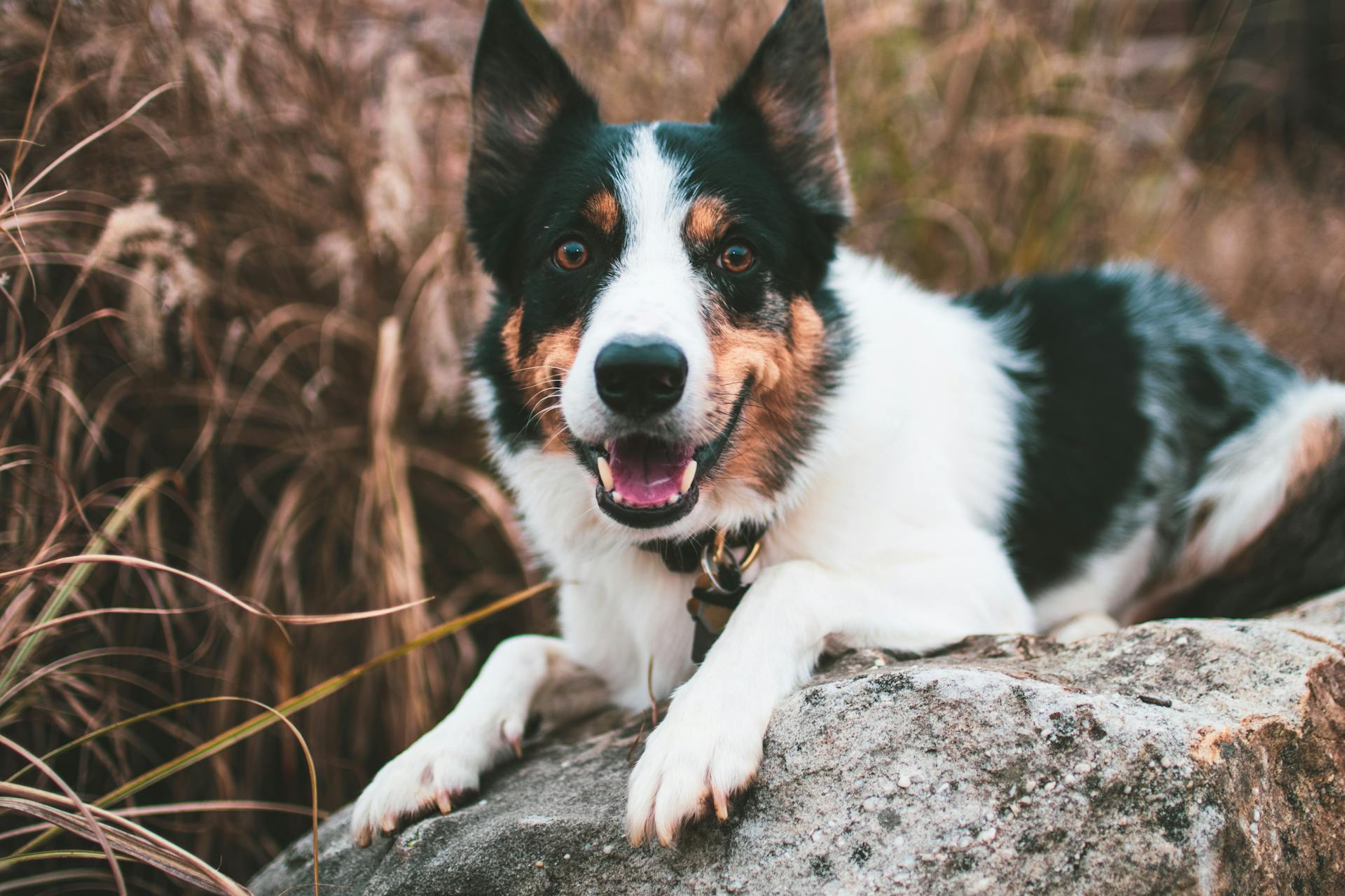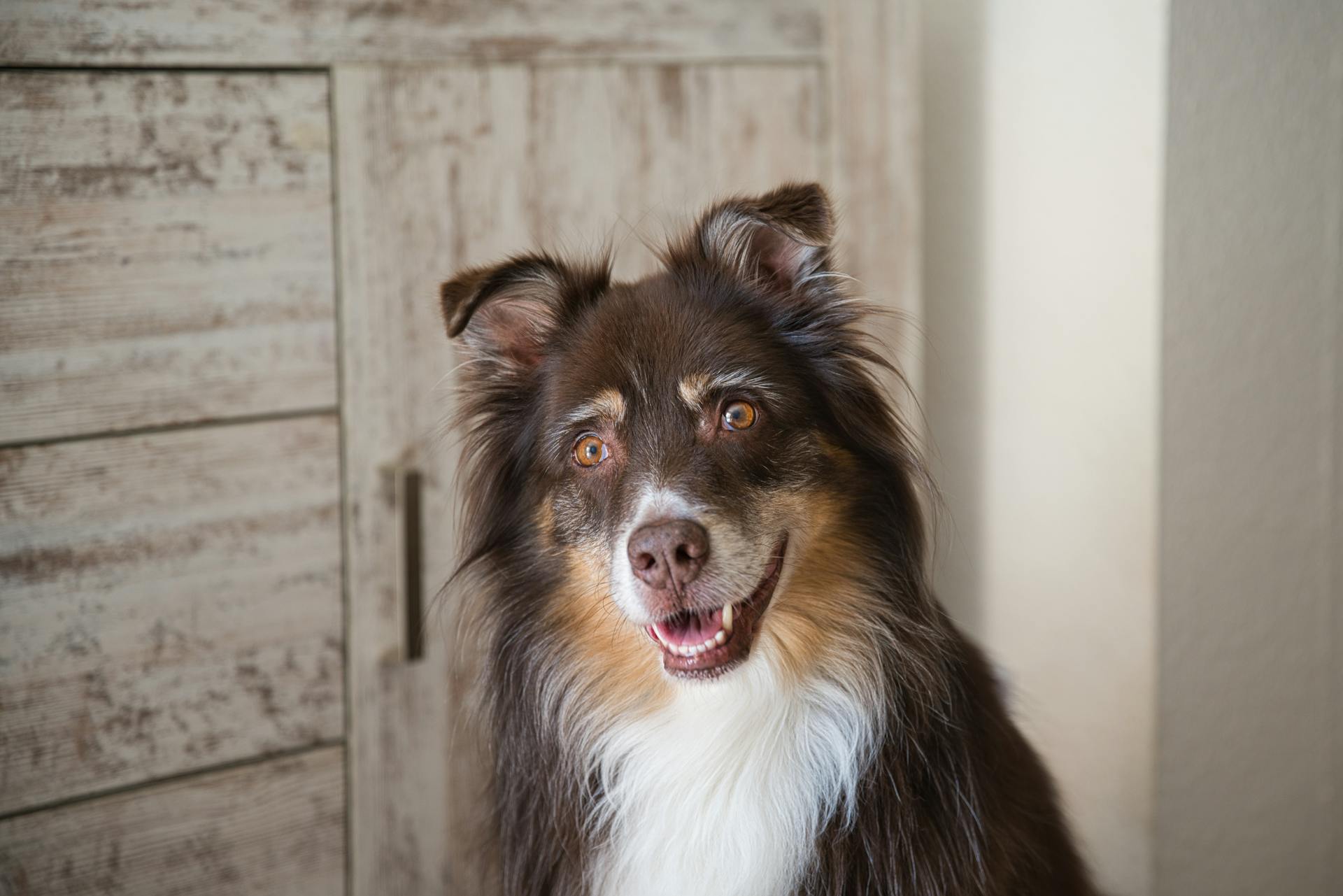
Border Collies are highly intelligent dogs, ranking 1st in Stanley Coren's book "The Intelligence of Dogs" for working and obedience intelligence.
Their high energy levels require at least 1 hour of exercise per day, making them a great fit for active owners.
Border Collies are generally healthy dogs, but they can be prone to deafness and collie eye anomaly, which affects 1 in 5 dogs.
With proper care and attention, Border Collies can live up to 12-15 years, making them a long-term companion.
Expand your knowledge: Shiba Inu .01
Care
Taking care of a Border Collie is a big responsibility, but with the right approach, it's incredibly rewarding. They require a great deal of mental and physical exercise every day, including a long jog or vigorous play or training for at least an hour.
To keep your Border Collie happy and healthy, make sure to provide a well-fenced yard, as they can be prone to wandering off if given the chance. They prefer fairly cool weather, so if you live in a hot climate, be sure to provide plenty of shade and water breaks.
Border Collies are highly intelligent dogs that excel at dog sports, such as herding, agility, obedience, nose work, tracking, and dock diving. They also love to play fetch, run, and jump, so be prepared to get active with your furry friend.
To keep their coat looking its best, brush your Border Collie several times a week, and daily during shedding seasons in the spring and fall. They should only need an occasional bath, but regular nail trimming and dental care are essential to keep them healthy and comfortable.
Here are some key facts to keep in mind when caring for your Border Collie:
- Height at withers: 18–22 inches (46–58 cm)
- Weight: 30–55 pounds (14–25 kg)
- Life span: 12–15 years
Health and Wellness
As a Border Collie owner, it's essential to be aware of the potential health concerns that may affect your furry friend. Many diseases and health conditions are genetic, meaning they are related to your pet's breed, and Border Collies are no exception.
Hip dysplasia is a common issue in Border Collies, where the hip sockets form abnormally, leading to arthritis and mobility problems later in life. This is why regular check-ups with your vet are crucial to catch any potential issues early on.
A different take: Hip Problems in Border Collies
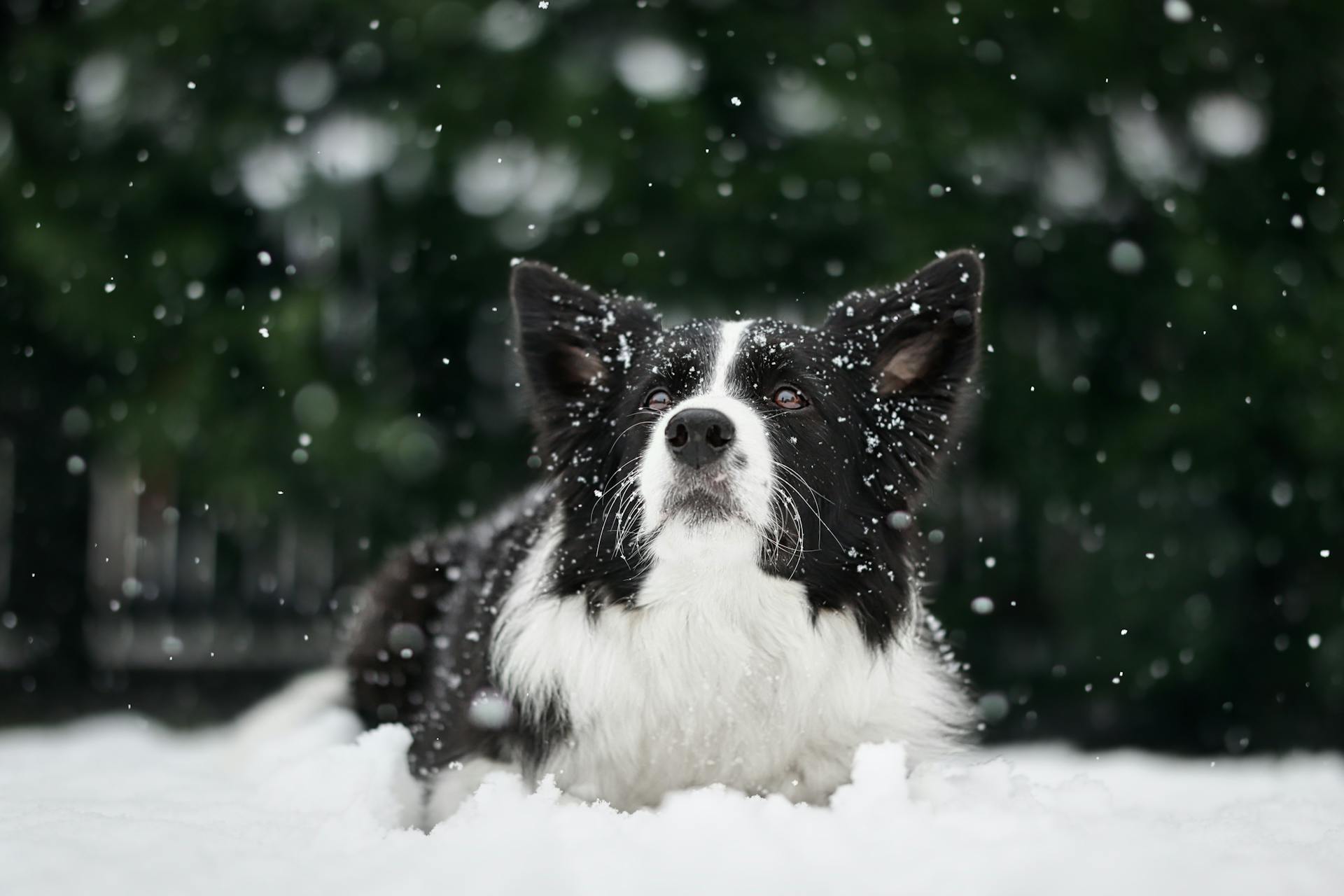
While Border Collies are generally a healthy breed, some hereditary health problems can occur. Osteochondritis dissecans (OCD) is another condition to be aware of, which results in the abnormal development of cartilage on the end of a bone. Epilepsy is also a neurological disease that causes seizures, and Collie eye anomaly is an inherited disease that impairs vision, although it's usually mild in Border Collies.
Here are some common health problems to watch out for:
- Hip dysplasia
- Osteochondritis dissecans (OCD)
- Epilepsy
- Collie eye anomaly
By being aware of these potential health concerns, you can work with your vet to create a preventive health plan tailored to your Border Collie's needs, and help keep your furry friend happy and healthy for years to come.
Exercise
Border collies are extremely high-energy dogs that need tons of exercise to keep their body and mind in good shape.
A minimum of two hours of exercise a day is essential, which can be achieved with two long, brisk walks on-leash.
You might like: How Much Exercise Do Border Collies Need
Border collies are prone to chasing cars and bicycles, so on-leash walks are a must.
Playing fetch or Frisbee in a safe area is a great way to work off some of that excess energy and provide a fun task for the dog to complete.
Border collies excel in dog sports, especially agility and disc dog competition, making them a great fit for active owners who enjoy participating in dog sports.
Diet and Nutrition
A border collie will need two meals a day of .75 to 1 cup of dry dog food each time, depending on the dog's size and activity level.
Providing fresh, clean water is essential for your dog's health.
You should note that your dog's nutritional needs will change throughout their life, so be sure to monitor their weight and adjust their diet accordingly.
If you notice your dog putting on weight, discuss this with your veterinarian to develop a plan of action, which may include changing the feeding schedule, type, or amount of food.
Your border collie is a naturally tireless dog, so be sure to provide enough daily exercise to keep them happy and healthy.
Curious to learn more? Check out: Could Shiba Inu Hit $1
Your Health
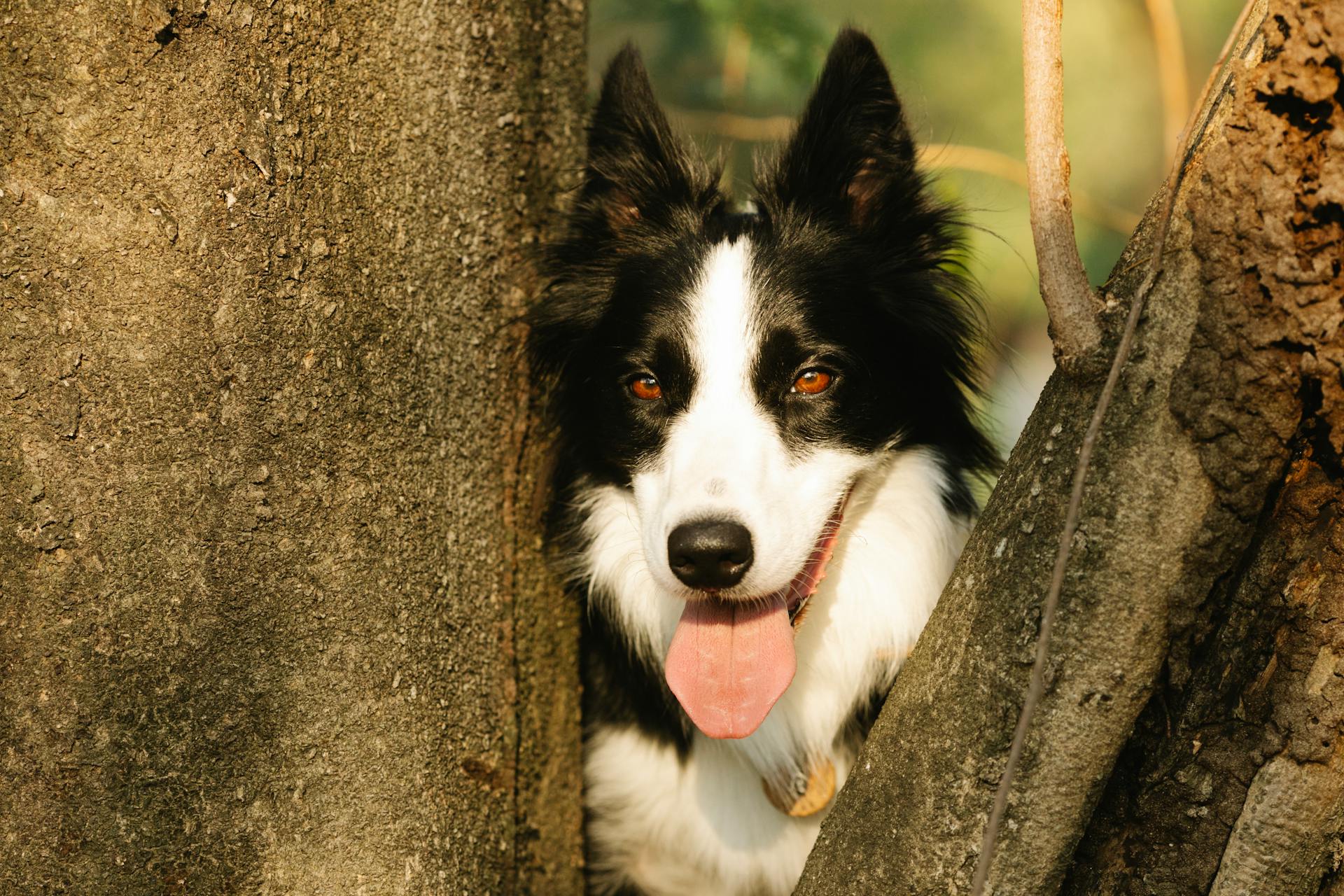
Your dog's health is a top priority, and as a responsible owner, you want to take good care of your furry friend. Many diseases and health conditions are genetic, meaning they are related to your pet's breed, and Border Collies are no exception.
Border Collies are generally a healthy breed, but some hereditary health problems can occur. Responsible dog breeders strive to maintain the highest breed standards, which can reduce the likelihood of inheriting health conditions.
It's essential to be aware of the common health problems that can affect Border Collies, such as hip dysplasia, osteochondritis dissecans (OCD), epilepsy, and Collie eye anomaly. These conditions can be inherited, and knowing about them can help you take preventative measures.
Here are some common health problems to be aware of in Border Collies:
- Hip dysplasia: a condition in which the hip sockets form abnormally.
- Osteochondritis dissecans (OCD): a condition resulting in the abnormal development of the cartilage on the end of a bone.
- Epilepsy: a neurological disease that causes seizures.
- Collie eye anomaly: an inherited disease that impairs vision, but is usually mild in Border Collies.
By being aware of these potential health issues, you can take steps to prevent or manage them, ensuring your dog stays happy and healthy for years to come.
Temperament and Behavior
The Border Collie's temperament is a unique blend of intelligence, energy, and sensitivity. They're often described as one of the smartest dog breeds, with an uncanny ability to learn and perform tasks quickly.
Their herding nature requires them to be active, alert, and responsive, which can be disastrous for families that don't have the time or inclination to provide challenging tasks. Without physical and mental stimulation, they can become anxious and destructive.
Border Collies are extremely playful and interactive, but they may be too active for young children or older adults. They tend to be a one-person or one-family dog, and may be aloof toward unfamiliar people, dogs, or other animals.
Here are some key characteristics of the Border Collie's temperament:
- High energy level
- High playfulness
- High trainability
- High intelligence
- High tendency to bark
They may bark excessively when excited, and are alert watchdogs but ineffective protection dogs. Overall, the Border Collie's temperament requires a lot of attention, exercise, and mental stimulation to keep them happy and healthy.
Getting Started in Sports
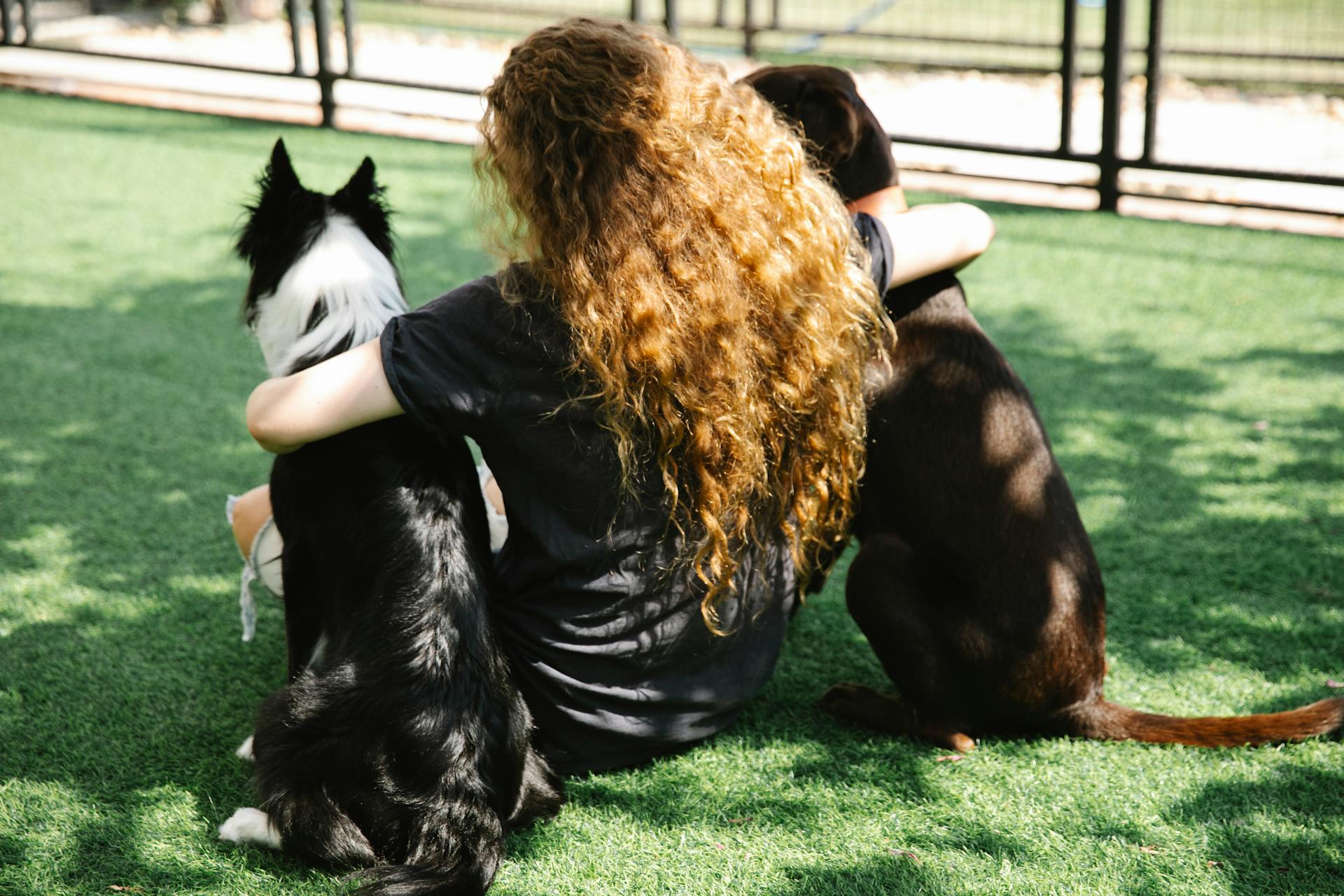
If you're new to dog sports, it's essential to start with the basics. You can begin by learning about the different types of dog sports and which one might be the best fit for you and your dog.
There are various dog sports to choose from, each with its unique requirements and benefits. You can enroll your dog in Canine Partners, which is a great way to get started, especially if you have a mixed breed.
Understanding dog sports titles and abbreviations can be confusing at first, but it's worth taking the time to learn the basics. This will help you navigate the world of dog sports with ease.
To get started in dog training, you can begin with simple exercises and gradually build up to more complex ones. This will help you and your dog build a strong bond and develop good communication skills.
If you're short on time or prefer to learn from the comfort of your own home, virtual dog sports and events are a great option. You can participate in online training sessions and connect with other dog owners and trainers.
See what others are reading: Are German Shepherds Good for First Time Owners
Temperament
The Border Collie's temperament is a unique blend of intelligence, energy, and sensitivity. This breed is often described as one of the smartest dogs in the world, with an uncanny ability to learn and perform tasks quickly.
Border Collies require a lot of physical and mental stimulation to prevent boredom and anxiety. Without it, they can become destructive and anxious, so it's essential to provide them with challenging tasks every day.
They thrive in active households with people of all ages, but may be too energetic for young children or older adults. A Border Collie may be aloof towards unfamiliar people, dogs, or other animals, and may bark excessively when excited.
Here's a breakdown of the Border Collie's temperament traits:
Border Collies are alert watchdogs, but not effective protection dogs. They're sensitive to noise and will alert you to visitors, passersby, and other movement. They may also be sensitive to sudden loud noises like fireworks and thunder.
What to Watch For
As you get to know your Border Collie's temperament and behavior, it's essential to be aware of any abnormal symptoms that could indicate a serious issue. Many diseases cause dogs to have a characteristic combination of symptoms.
Some common signs that something might be wrong include changes in appetite, energy levels, or stool quality. These can be subtle, so it's crucial to pay close attention to your dog's habits.
Abnormal vomiting or diarrhea can be a clear signal that your Border Collie needs help. It's also important to keep an eye out for changes in your dog's behavior, such as increased anxiety or aggression.
Any unusual whining or whimpering could be a sign of pain or discomfort. If you notice any of these symptoms, it's always better to err on the side of caution and seek veterinary help.
For another approach, see: Alaskan Malamute Behavior
History and Background
The border collie breed has a rich history that dates back to the British Isles. It was developed on the border of England and Scotland, which is how it got its name.
This dog has remained true to its origins as a hardy, diligent, working dog. The breed was influenced by Queen Victoria in the mid-1800s, who became fond of it and likely contributed to its legacy as the ideal sheep-herding dog breed.
The border collie was officially recognized by the AKC in 1995, and it has since become a beloved breed.
History of the
The border collie breed has a rich history that dates back to the British Isles, where it was developed as a hardy, diligent, working dog on the border of England and Scotland.
The breed's origins as a sheepdog are still evident today, and it's easy to see why Queen Victoria became fond of them in the mid-1800s.
The border collie was brought to Australia and New Zealand in the past century, where it thrived on sheep ranches.
This breed has a long history of success in herding, agility, Frisbee, and other activities, which is a testament to its intelligence and work ethic.
See what others are reading: Shetland Sheepdog History

The border collie was officially recognized by the AKC in 1995, and it's also gained fame in pop culture, starring in the beloved movie, Babe.
It's worth noting that the border collie should not be confused with the Australian shepherd, which is another herding breed with a different appearance and history.
The Future of the Breed
The Border Collie has evolved significantly over the past 100 years, with its name becoming established around that time.
The breed's versatility has led to different groups of breeders focusing on distinct qualities, such as herding ability and agility.
Shepherds prioritize the strong herding instinct and intelligence, which is already resulting in dogs that don't fit into traditional physical "types".
Agility competitors often favor smaller, faster Border Collies, which may lead to a decrease in the breed's average size over time.
Preservation breeders like myself aim to maintain the breed's original "type" while improving overall health, but this can be challenging without access to livestock and herding opportunities.
A different take: Border Collie Dog Agility
Frequently Asked Questions
Was Lassie a collie or Sheltie?
Lassie is a rough-coated Collie, a breed known for its intelligence and bravery. This iconic character helped popularize the Collie breed, making them beloved and admired worldwide.
How long do Lassie collies live?
Collies typically live for 12-14 years, but with proper care, they can outlive this expectancy.
Featured Images: pexels.com


